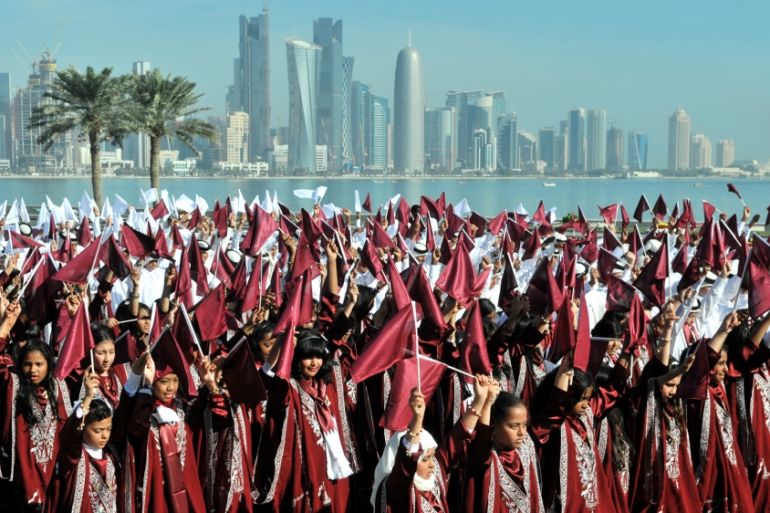Qatar’s finances boosted by Qataris repatriating wealth

The Qatar Financial Centre (QFC) is seeing a surge in business as Qataris register more of their assets at home and multinationals navigating a Gulf boycott of the country boost their local presence, its chief executive told Reuters.
The diplomatic and trade boycott imposed in June by Saudi Arabia, the United Arab Emirates, Egypt and Bahrain has changed the way business is done with Qatar, the world’s largest liquefied natural gas exporter and host of the 2022 World Cup.
Keep reading
list of 4 itemsWhy are nations racing to buy weapons?
Parallel economy: How Russia is defying the West’s boycott
US House approves aid package worth billions for Ukraine, Israel
State-owned companies, or companies owned by mostly Qatari shareholders, and rich individuals are redirecting their investments to the Qatar Financial Centre, the QFC’s head Yousuf al-Jaida told Reuters in an interview in Doha, Qatar’s capital.
It reflects nervousness among the country’s elite that investments registered abroad could be frozen, as well as a desire by international companies to maintain close ties with the world’s biggest liquefied gas producer.
The trend, he said, has seen migration from Dubai in neighbouring UAE, which was traditionally the hub for companies doing business across the Gulf, from Saudi Arabia to Kuwait. The shift to Doha is the result of the diplomatic and trade boycott of Qatar by Saudi Arabia, the United Arab Emirates, Egypt and Bahrain on June 5.
“They panicked”
“The immediate action was that … a lot of the companies that had their special purpose vehicles set up in Dubai International Financial Centre were re-routing their investments in (to) the QFC because they wouldn’t know what the uncertainty factor would lead to eventually and how long this will go on for,” al-Jaida said.
“They would rather hold those international assets from here (Qatar) rather than face uncertainty there because of their Qatari background or nationality,” he said. “They panicked.”
Al-Jaida also pointed to the number of companies registered in the Qatar Financial Centre, which has increased 45 percent in the third quarter compared with the year earlier. When compared with the second quarter, in the wake of the boycott, growth rose 6.9 percent, from 390 companies to 417 companies registered at QFC with $20 bn in assets, QFC said in a statement.
Al-Jaida said some of these investments had previously been registered in Dubai’s financial free zone but have moved to Qatar after the boycott began in June. He did not provide the value of the assets those companies hold.
“They don’t know how they will be treated by nearby countries,” he said. “So a lot of the companies that used to set up in blockade countries are coming back home.”
The Dubai International Financial Centre told Reuters that it has seen an increase in the number of companies registered this year, when asked whether some Qatari companies had moved to Doha.
“In 2017, the number of companies operating in DIFC increased by six percent to 1,750 as at June 30. The number has continued to grow further still in H2 2017,” it said in an email.
“It’s never been better”
The blockading countries accused Qatar of financing violent groups operating in the Middle East, and allying with their regional foe Iran at the expense of Gulf security, allegations Doha denies.
In the aftermath of this diplomatic row, some Gulf investors withdrew deposits from Qatari banks and pulled funds out of Doha’s stock market. It has also made it harder for international companies wanting to maintain ties with Qatar.
“You can no longer service the region from one country, wherever you are, and you’re going to have logistical problems. Unfortunately, politics and business are being mixed up in the region,” al-Jaida said.
Previously, many multinational companies in the region used Dubai as a base to do business with Qatar. But because of disruption to travel and banking links, some are now ramping up their presence in Doha, he said.
“We’re seeing a lot of the multinationals who used to service Qatar from abroad and nearby financial centres in blockade countries unable to freely travel so they are having to put three, four or five more people here on the ground to continue that relationship.”
Al-Jaida said emotions were playing an increasing role in business, and that some Qataris were hesitant in doing business with foreign companies unless they had a local presence.
“For us, it’s a good period,” he said. “It’s never been better.” The boycott has prompted Qatar to embrace multinationals and foreign investment. It has made economic reforms and has opened up visas to more than 80 nationalities.
Qatar’s Emir Sheikh Tamim bin Hamad Al Thani recently said his government was focusing on completing strategic projects to cope with the sanctions, including ports, water and food security. “If it wasn’t for the crisis this probably would have taken a decade,” said al-Jaida.